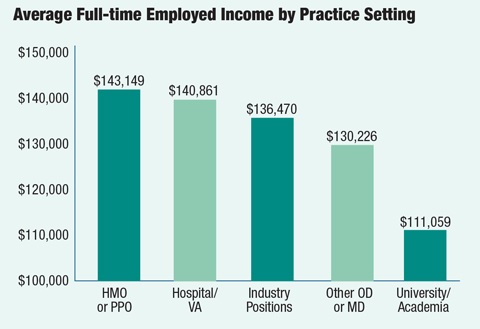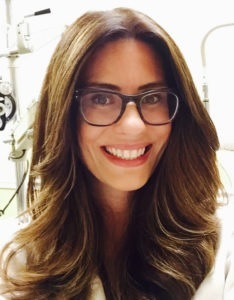By Courtney Case, OD

Jan. 10, 2018
Practicing optometry in a hospital setting can be a rewarding career path that allows you to focus on medical eyecare while working with a team of healthcare providers to provide total care to patients.
My introduction to hospital-based optometric care was at a VA hospital as an intern. That great experience transitioned into a residency with the Veterans Administration.
In the wake of 9/11, my friend was killed in military action, and so I felt a need to help generations of men and women who put their lives on the line for freedom. They had fought in Iraq or Afghanistan, and I felt good about both helping and learning from them.
At the end of residency, I was encouraged by the positive experience I gained. My residency director recommended me for a position at Jacobi Hospital in Bronx, NY. I interviewed with the chief of ophthalmology, and was granted the position.
I started at Jacobi part time and maintained private practice hours, as well. The path of hospital-based care varied greatly from what I had envisioned at the start of school. I imagined being a small-town optometrist with a boutique on Main Street, USA.
With time, I found my hospital experience to be invaluable, as I gained a knowledge base and experience that has made me a better doctor.

The recently published Review of Optometry 2017 Income Survey shows that the average income for FTE ODs in a hospital/VA is $140,861, just under the compensation for ODs in an HMO or PPO, but higher than for ODs in industry positions, working for other ODs or MDs, or in university/academia.
Is the Hospital Setting Right for You?
A hospital-based ocular disease residency served as the baseline for my mode of practice. However, residency is not a requirement to work in a hospital. The right candidate for hospital-based work is an OD who is open to encountering the “zebra” in clinical care and diagnosis. The likelihood of unusual diagnoses is higher in hospitals, especially those located within immigrant communities that have not had previous access to comprehensive ophthalmic care.
Since working in a hospital means seeing a greater diversity of eye conditions than you would probably see in private practice, you have to be OK with not always having the answer on your own. The best OD for working in a hospital is one who is interested in investigating further when confronted with a challenge, and thus, continually growing. It is a job that requires an open mind for treating a diverse community, and a strong impulse toward compassionate care.
Experience the Holistic Approach to Care
Working in a hospital introduced me to holistic patient care. In this context, holistic patient care refers to evaluation of the whole body versus segmented or specialized care. Retinal health is often a gauge of overall health. As such, optometrists have the privilege to assess not only ocular health, but sometimes systemic health, as well. In a hospital, I often work with patients who have been diagnosed with systemic conditions like diabetes, who have developed, or are at risk for, retinal complications.
Working in a hospital gives you more insight into a patient’s overall health than you might have in private practice. A key advantage of hospital-based care is access to the patient’s full medical history. This has been a significant benefit for the evaluation of retinal health, and to fully care for my patients. As most of us have encountered, patients are often poor historians with fragmented health information. Most commonly, their list of medications is incomplete, or fasting blood sugars levels are unknown.
Additionally, blood pressures are routinely collected as part of hospital entry testing on each patient. As a direct result, detection of either undiagnosed hypertension, or patients who are non-compliant with medication, are a common finding.
In addition, blood draws are able to be performed on site and the same day, whether for detection of sjogrens, inflammatory conditions, or even diabetic keto-acidosis. This provides the optometrist with immediate information on patients. By contrast, in private practice there can be significant delays in care when patients are referred to a lab for testing, or perhaps they may not follow-up and go.
The hospital’s on-site laboratory access, along with staff and supplies, have enhanced my ability to diagnose and treat pathology.
Can You Handle High Volume?
A significant challenge encountered within a hospital setting is the emphasis on patient volume. Administrators have to meet goals in patient numbers, and therefore, emphasize need to their doctors. To run a hospital or health center requires a degree of financial gain, as does private practice. However in hospitals, there may be a larger percentage of Medicaid, or self-pay, patients than you would find in private practice. This equates to minimal reimbursement with many patient encounters. Federally funded grants help hospitals bridge the gap, but maintaining a high patient volume is still important.
Additionally, there tends to be a higher no-show rate with patient encounters than most private practitioners experience. To subsidize these lost encounters, patients are double-booked.
Gain Exposure to Multiple Eyecare Specialties
There is a lot to be learned in a hospital from other optometrists and ophthalmologists. For instance, the chief of ophthalmology at Jacobi Hospital was a brilliant neuro-ophthalmologist. I was able to work alongside him in addition to other specialties, such as retina, cornea, glaucoma and pediatrics. This experience allotted me the good fortune of gaining experience in every realm of eyecare at a level 1 trauma center.
Enjoy Generous Employment Benefits
Hospitals typically offer comprehensive benefit packages. State- or county-run hospitals may even offer pensions. Many, if not most, private practitioners hire optometrists per diem without benefits.
A position at the right hospital can mean the ability to experience a wide scope of medical eyecare, as part of a team of doctors, in addition to the advantages of comprehensive benefits.
 Courtney L. Case, OD, FAAO, RYT, is an attending optometrist for Long Island Federally Qualified Health Centers, a division of Nassau University Medical Center in East Meadow, NY., and Bedford Stuyvesant Community Health Center in Brooklyn, NY. To contact: caselynn9@yahoo.com
Courtney L. Case, OD, FAAO, RYT, is an attending optometrist for Long Island Federally Qualified Health Centers, a division of Nassau University Medical Center in East Meadow, NY., and Bedford Stuyvesant Community Health Center in Brooklyn, NY. To contact: caselynn9@yahoo.com



























